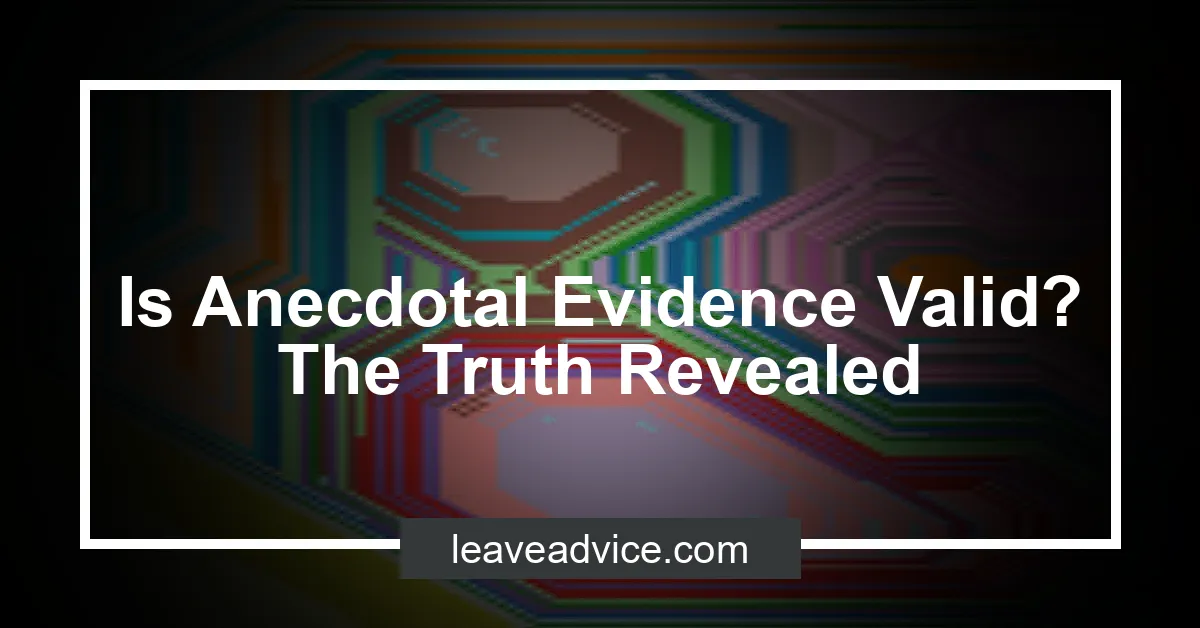Is Anecdotal Evidence Valid? The Truth Revealed


Yes, anecdotal evidence is a form of evidence based on personal stories and observations. It is often used to support a claim or conclusion, but is not considered reliable or valid in the scientific community.
Anecdotal evidence is not considered valid in the scientific community because it is based on individual accounts and lacks systematic and reliable research or statistics. While it can be used to suggest new hypotheses, it is not used as validating evidence.
Anecdotal evidence is not considered valid due to its limited value and potential weaknesses. It is based on personal testimony and is not reliable for making generalizations or drawing conclusions.
Check out this Youtube video: “Anecdotal Evidence: How to use critical thinking skills to determine if anecdotal evidence is valid” and gain valuable insights into the importance of critical thinking in evaluating anecdotal evidence.
The Nature of Anecdotal Evidence
Anecdotal evidence constitutes information derived from personal experience or observation, typically gathered in a non-systematic manner. It is often used to learn about experiences, products, and to help prove a point, but it is not considered scientific evidence due to the lack of objective verification.
When used in advertising or promotion, anecdotal reports are commonly referred to as testimonials. This kind of evidence often relies on anecdotes that are presented as true stories, representing real people and events, which are used to support a claim or argument.
What constitutes anecdotal evidence
Anecdotal evidence is simply evidence based on personal observation or experiences, collected casually or non-systematically. It often takes the form of stories that people share about what has happened to them.
This notion is not supported by rigorous data but rather draws strength from personal accounts that may or may not be representative of the broader reality.
Types of anecdotes and their use in supporting claims
Anecdotes come in various forms, including cautionary, characterizing, humorous, inspirational, and reminiscent. They are short and self-contained stories that illustrate a point or support a claim.
For instance, a humorous anecdote can add levity to a serious topic, while an inspirational anecdote can offer encouragement or motivation. These anecdotes are utilized to bolster claims, evoke emotion, or provide real-life context to supplement an argument or belief.
| Types of Anecdotes | Use in Supporting Claims |
|---|---|
| Humorous | Adds humor to the topic |
| Reminiscent | Evokes nostalgia |
| Inspirational | Provides motivation |
| Cautionary | Offers warnings |
| Characterizing | Illuminates personalities |
While anecdotal evidence can be persuasive, it is crucial to recognize its limitations and ensure that it is complemented by more robust, empirical evidence.
Let’s discuss other aspects of this intriguing topic next!
The Validity Question
Addressing the validity of anecdotal evidence
Anecdotal evidence can provide valuable insights based on personal experiences or observations. However, it lacks scientific rigor and can be subjective, making it less valid in establishing general truths.
Therefore, while anecdotal evidence is useful for generating hypotheses and understanding individual experiences, it may not always be reliable for making broader claims or drawing definitive conclusions.
Analyzing the limitations of anecdotal evidence in determining truth
The limitations of anecdotal evidence lie in its susceptibility to individual interpretation and bias. It can also be influenced by selective perception, memory distortion, and the tendency to highlight exceptional experiences.
Consequently, relying solely on anecdotal evidence may lead to invalid or misleading conclusions, especially when seeking to establish universal truths or inform significant decision-making processes.
| Pros of Anecdotal Evidence | Cons of Anecdotal Evidence |
|---|---|
| Provides personal insights | Subjective and biased |
| Useful in generating hypotheses | Lacks scientific rigor |
| Offers diverse perspectives | Vulnerable to memory distortion |
Understanding the Role of Anecdotal Evidence
Anecdotal evidence plays a crucial role in personal experiences by providing real-life stories and narratives that can deeply resonate with individuals. These personal accounts often carry a significant emotional weight, making them relatable and impactful, especially when trying to understand the human dimension of an issue or decision.
The importance of anecdotal evidence in personal experiences
Anecdotal evidence can serve as a powerful validation or counterpoint to statistical or empirical data. For example, when considering the effectiveness of a new medication, personal anecdotes may highlight specific side effects or benefits that were not apparent in clinical trials.
This can guide individuals towards more informed decisions and personalize their understanding of various situations.
How anecdotal evidence can influence beliefs and opinions
Anecdotal evidence has the potential to deeply influence beliefs and opinions. Humans are wired to connect with stories, and when a compelling anecdote aligns with personal experiences or emotions, it can shape perceptions and attitudes.
For instance, a touching account of someone’s experience at a particular restaurant can influence others’ decisions to visit the establishment.
| Pros of Anecdotal Evidence | Cons of Anecdotal Evidence |
|---|---|
| Provides a human element | Subject to individual bias |
| Helps in contextualizing data | Does not represent a comprehensive view |
| Can supplement empirical evidence | May lead to unfounded conclusions |
While anecdotal evidence has its limitations, its impact on personal experiences and beliefs cannot be underestimated, and it often serves as a relatable and persuasive form of evidence.
The Scientific Perspective
Anecdotal evidence and scientific evidence are fundamentally different in their approach and reliability. Anecdotal evidence relies on personal testimony and informal observations, making it subjective and prone to individual biases.
On the contrary, scientific evidence is based on systematic observation, measurement, and experimentation, ensuring objectivity and reproducibility.
When contrasting anecdotal evidence with scientific evidence, it’s essential to understand that anecdotal evidence is often based on isolated instances and lacks the rigor and control of scientific research. Scientific evidence, on the other hand, follows strict methodologies, controls for variables, and undergoes peer review, enhancing its credibility and reliability.
Exploring the differences in reliability and validity, it’s crucial to note that anecdotal evidence lacks the reliability and validity of scientific evidence. Reliability in scientific research refers to consistency, ensuring that results can be replicated under similar conditions.
Validity, on the other hand, pertains to the accuracy of the measure and confirms that the results represent what they are intended to measure.
While anecdotal evidence may offer personal perspectives, scientific evidence stands as the gold standard due to its rigorous methodology, objectivity, reproducibility, and adherence to reliability and validity principles.
| Aspect of Evidence | Anecdotal Evidence | Scientific Evidence |
|---|---|---|
| Collection Method | Informal, personal testimony | Systematic observation, measurement, experimentation |
| Reliability | Lack of consistency and reproducibility | High level of consistency and reproducibility |
| Validity | Prone to individual biases | Objectivity and accuracy |
Real-Life Examples
Providing real-life examples of anecdotal evidence in everyday situations, let’s take a memorable case where a friend raved about a new skincare product claiming it erased their wrinkles overnight. Another classic example is a relative swearing by a specific diet for weight loss after trying it for just a week.
These instances are anecdotal evidence in action, based on personal experiences and opinions rather than verified scientific data.
Explaining how anecdotal evidence can be misleading, consider a scenario where someone claims a particular herbal remedy cured their chronic illness. While it may seem convincing, relying solely on individual accounts can lead to misleading conclusions and risky decisions.
This is where the line blurs between personal experiences and statistical evidence, highlighting the potential pitfalls of anecdotal evidence.
| Everyday Situations | Misleading Examples |
|---|---|
| Friend’s skincare miracle claim | Relative’s rapid weight loss from a new diet |
| Acquaintance’s cure-all herbal remedy | Colleague’s “guaranteed” stock market strategy |
In essence, while anecdotal evidence may provide valuable insights, its inherent subjectivity necessitates careful consideration and scrutiny before drawing definitive conclusions.
Historical Context
Anecdotal evidence has been used throughout history to prove points, illustrate events, and sway decisions. In ancient times, stories of heroic feats and mythical creatures were passed down through generations, shaping cultural beliefs and traditions.
During pivotal historical events, such as wars and revolutions, personal accounts were relied upon to document the experiences of individuals and communities. These narratives provided insights into the human experience and offered a glimpse into the emotions and motivations driving pivotal moments in history.
In making critical decisions, leaders often turned to anecdotal evidence to gauge public sentiment and understand the impact of their policies. From political campaigns to social movements, personal stories and testimonials have been instrumental in influencing public opinion and inspiring collective action.
While anecdotal evidence lacks scientific rigor, it has played a significant role in shaping the historical narrative, imparting valuable lessons and leaving a lasting impact on the collective consciousness.
| Examples of Historical Use of Anecdotal Evidence |
|---|
| – Oral traditions shaping cultural beliefs |
| – Personal accounts documenting pivotal events |
| – Influence of anecdotes on public opinion |
| – Utilization of personal stories in inspiring collective action |
Thus, while anecdotal evidence may not always adhere to scientific standards, its historical significance cannot be overlooked. This evidence has not only captured the essence of human experiences but has also shaped the course of history, yielding profound implications and sparking transformative change.
Counterarguments
When addressing common criticisms of anecdotal evidence, it’s essential to recognize that while anecdotal evidence may lack the systematic approach of scientific studies, it should not be outright dismissed. Anecdotal evidence often serves as the initial spark that ignites further investigation and research.
For instance, many medical breakthroughs can be traced back to anecdotal patient reports, prompting rigorous scientific scrutiny.
While exploring potential biases and errors in anecdotal accounts, it’s crucial to remember that bias is inherent in all forms of evidence, including scientific studies. Anecdotal evidence should be evaluated on a case-by-case basis, acknowledging the potential for individual bias while also recognizing the authenticity of personal experiences.
It’s analogous to recognizing that while a single witness’s testimony in a court case may not necessarily represent the entire truth, it can provide crucial insights that complement the broader body of evidence.
| Types of Bias | Examples of Anecdotal Evidence Bias |
|---|---|
| Confirmation Bias | Swaying opinions based on preconceived notions |
| Survivorship Bias | Drawing conclusions from only successful instances |
| Availability Bias | Overestimating the significance of recent or vivid events |
| Outlier Bias | Giving excessive weight to unusual or extreme anecdotal data |
Statistics vs. Anecdotes
When comparing and contrasting statistics and anecdotal evidence, it’s crucial to note that statistics are based on quantifiable data from large sample sizes, providing a broad overview. On the other hand, anecdotal evidence relies on personal experiences, often involving smaller sample sizes and individual perspectives.
While statistics offer general trends, anecdotal evidence captures individual stories that may lack broader applicability.
Statistical data can supplement anecdotal experiences by providing context or validating individual accounts with broader patterns. For instance, a company claiming its product has improved customer satisfaction can use statistical data to support individual customer testimonials.
Conversely, statistical data can contradict anecdotal experiences by showcasing a different trend from individual stories, revealing a disparity between personal experiences and broader realities.
| Statistics | Anecdotes |
|---|---|
| Quantitative | Qualitative |
| Large sample sizes | Small sample sizes |
| General trends | Individual stories |
| Broad applicability | Personal perspectives |
The Influence of Anecdotes in Media
Analyzing the use of anecdotes in news and entertainment
Anecdotes are like the secret sauce of storytelling, adding flavor and relatability to news and entertainment. In news, they bring a human touch to otherwise dry information, making it more engaging for the audience.
For instance, sharing personal experiences of individuals impacted by a situation can provide a different perspective that statistics alone can’t convey. In entertainment, anecdotes add depth to characters and help the audience connect emotionally, intensifying their engagement with the storyline.
They create a memorable experience and make the content more impactful.
Discussing the implications of anecdotal evidence in shaping public opinion
Anecdotal evidence can significantly influence public opinion by fostering emotional connections and personal identification. When people see or hear relatable stories, they tend to align their opinions with the depicted experiences.
For example, in a news report about employee benefits, a heartfelt anecdote about how a certain benefit positively impacted an employee can sway public opinion on similar matters. These anecdotes create a human connection, making the information more persuasive and memorable.
However, it’s crucial to recognize that while anecdotes can be powerful, they are not always representative of broader trends and should be balanced with empirical evidence.
| Pros | Cons |
|---|---|
| Increases engagement | May lack representativeness |
| Establishes emotional connection | Potential bias in storytelling |
| Makes content memorable | Not always supported by empirical data |
Anecdotes play a vital role in shaping public opinion by adding the human touch to news and entertainment. While they can be a powerful tool in communication, it’s essential to critically evaluate their implications and recognize their limitations in presenting a comprehensive understanding of complex issues.
The Legal Perspective
Anecdotal evidence in the legal system plays a nuanced role. While it can be compelling and relatable, courts generally view it as less reliable compared to empirical evidence.
Its impact on legal proceedings is often limited due to its casual and non-systematic nature. Understanding the role of anecdotal evidence involves recognizing its potential to illustrate a point but acknowledging its limitations in establishing concrete facts in the legal context.
How anecdotal evidence is presented and evaluated in court cases requires a thoughtful approach. Legal professionals must carefully analyze the relevance and reliability of anecdotal evidence, considering its potential impact on a case.
Despite its limitations, anecdotal evidence can still provide context and human connection to legal proceedings, contributing to a more comprehensive understanding of the issues at hand.
| Pros of Anecdotal Evidence | Cons of Anecdotal Evidence |
|---|---|
| Offers human connection | Limited reliability |
| Provides context | Less rigorous than empirical evidence |
The legal perspective on anecdotal evidence emphasizes the need for a balanced approach. While it can offer valuable insights, it must be assessed with caution within the framework of legal proceedings to ensure fair and just outcomes.
Ethical Considerations
Discussing the ethical implications of relying on anecdotal evidence
Relying on anecdotal evidence can lead to ethical dilemmas as it may not provide a comprehensive and reliable understanding of a situation. When making decisions based on anecdotes, there’s a risk of overlooking broader perspectives and statistical evidence, potentially leading to biased conclusions.
Ethically, it’s crucial to consider the broader impact and potential consequences of relying solely on anecdotal evidence, as it may not represent the full spectrum of experiences and could inadvertently marginalize certain groups.
Addressing the potential harm caused by anecdotal misinformation
Anecdotal misinformation can perpetuate false beliefs and lead to detrimental outcomes, affecting public perception and decision-making processes. It has the potential to mislead individuals, impacting their choices and behaviors based on inaccurate or incomplete information.
This misinformation can also contribute to societal division and discord by amplifying unfounded narratives. Therefore, it’s essential to address and counteract anecdotal misinformation by promoting critical thinking, encouraging evidence-based practices, and fostering a culture of open dialogue and fact-checking.
| Potential Harm of Anecdotal Misinformation | Measures to Address |
|---|---|
| Misleading Public Perception | Promoting critical thinking and fact-checking practices. |
| Impacting Decision-Making Processes | Encouraging evidence-based approaches and open dialogue. |
| Contribution to Societal Division | Fostering a culture of validating information and narratives. |
Let’s stay ethically responsible and vigilant against the potential risks of anecdotal evidence and misinformation.
Critical Thinking and Anecdotal Evidence
Advocating for critical thinking in evaluating anecdotal claims
Anecdotal evidence often holds the allure of personal experiences and compelling stories, but advocating for critical thinking in evaluating such claims is imperative. While anecdotes can offer valuable insights, they may not always be universally applicable.
It’s crucial to approach anecdotal evidence with a level of skepticism and critical analysis to avoid generalizing from isolated instances. By encouraging critical thinking, individuals can discern the broader implications of anecdotal evidence and recognize its limitations in contributing to a comprehensive understanding of a given topic.
Providing guidelines for critically assessing anecdotal evidence
Guidelines for critically assessing anecdotal evidence involve scrutinizing the source’s credibility, potential biases, and scope of relevance. Individuals should consider the context in which the anecdote arose and assess whether it aligns with established knowledge or research findings.
Additionally, seeking corroborating evidence or diverse perspectives can contribute to a more comprehensive evaluation of anecdotal claims. By emphasizing critical assessment, individuals can navigate the intricate landscape of anecdotal evidence with a discerning approach, ensuring a more nuanced understanding of its implications and limitations.
| Aspect of Assessment | Considerations |
|---|---|
| Source Credibility | Evaluate the source’s expertise and potential biases. |
| Relevance | Assess the anecdote’s applicability within a broader context. |
| Corroborating Evidence | Seek supporting anecdotes or diverse perspectives to validate claims. |
By advocating for critical thinking and providing guidelines for assessing anecdotal evidence, individuals can navigate the complexities of this form of evidence more effectively, ultimately fostering a more informed and discerning approach to evaluating anecdotal claims.
All in all, approaching anecdotal evidence with a critical lens serves to enrich the decision-making process, promoting a more discerning and well-rounded perspective in various domains where anecdotal evidence is prevalent. Remember, critical thinking is the linchpin in unraveling the complexities and unlocking the true potential of anecdotal evidence.
Anecdotal Evidence in Healthcare
Exploring the use of anecdotal evidence in alternative medicine
In alternative medicine, anecdotal evidence often plays a significant role in shaping patient experiences and expectations. Personal stories of individuals who have found relief or improvement through alternative treatments can influence others’ decisions to explore those same treatments.
For example, a friend’s account of reduced back pain after acupuncture might sway someone to try the same treatment.
Discussing the impact of anecdotal testimonials on healthcare decisions
Anecdotal testimonials in healthcare decisions can hold substantial sway over individuals. For instance, if someone hears numerous success stories about using herbal remedies to manage anxiety, they may lean toward these alternative methods despite the lack of scientific evidence.
This impact can sometimes overshadow the emphasis on evidence-based medicine, leading to personal experiences driving treatment choices.
| Pros of Anecdotal Evidence | Cons of Anecdotal Evidence |
|---|---|
| Provides personal insight | Subject to individual bias |
| Influences decision-making | Lacks scientific validation |
Remember, while anecdotes can offer valuable insight and influence, they should be considered in conjunction with evidence-based practices to make well-informed healthcare decisions.
Industry Influence
Anecdotal evidence is commonly used in marketing and advertising as testimonials or personal stories to create a relatable connection with the target audience. It is often leveraged to showcase real-life experiences of individuals who have benefitted from a product or service.
These stories aim to resonate with potential consumers on a personal level, thereby influencing their purchasing decisions.
Anecdotal evidence in marketing and advertising has a distinctive way of tapping into emotions and building trust. By sharing personal narratives and testimonials, businesses can establish deeper connections with their audience, invoking a sense of authenticity and reliability.
This approach can be particularly effective in industries where consumer trust and personal experiences play a significant role, such as health and beauty.
The ethical implications of using anecdotal evidence in promoting products or services revolve around transparency and truthfulness. While anecdotes can be compelling, it’s crucial for businesses to ensure that these narratives accurately represent the majority of experiences with their products or services.
There’s an ethical responsibility to present anecdotal evidence in a fair and balanced manner, avoiding the exaggeration of benefits or misrepresenting the actual outcomes.
Debunking Anecdotal Myths
Anecdotal evidence often perpetuates common misconceptions, leading to false beliefs being accepted as truth. For example, the notion that organic foods lead to a longer life, based on an individual’s experience, disregards scientific evidence and statistical data.
Similarly, the claim that a single person’s positive encounter with a Toyota makes it the most reliable car overlooks broader reliability statistics.
Exposing these myths helps to highlight the inherent unreliability of anecdotal evidence. While compelling, such stories should not substitute for robust scientific inquiry and statistical analysis.
By debunking these anecdotal claims, it becomes clear that personal experiences do not necessarily reflect broader realities.
One real-life example of debunked anecdotal claims is the belief that vaccinations are unnecessary, based on a few cases of unvaccinated individuals remaining healthy. This myth has been refuted by comprehensive scientific evidence, emphasizing the importance of relying on rigorous research rather than individual stories.
Another example can be found in the area of exercise, where some individuals discredit the necessity of physical activity based on personal experiences. Research showcasing the wide-ranging benefits of exercise counters these anecdotal fallacies, highlighting the need for evidence-backed knowledge.
Debunking anecdotal myths helps to uphold the significance of robust scientific evidence, steering us away from relying solely on individual experiences to shape broader perceptions and decisions.
Recommended Amazon Products for Evaluating Anecdotal Evidence
Here’s a curated list of products that can help you evaluate anecdotal evidence with ease. These recommendations are based on reliability, customer reviews, and functionality.
Ring Alarm 8-Piece Kit


The Ring Alarm 8-Piece Kit is recommended for enhancing home security. It offers easy installation, reliable performance, and the ability to expand the system with additional components.
Blink Mini Indoor Security Camera


The Blink Mini Indoor Security Camera is a great option for monitoring indoor spaces. With motion detection, two-way audio, and an easy setup process, it provides a simple and effective way to gather evidence.
Wyze Cam Pan Smart Home Camera


For those in need of a versatile surveillance option, the Wyze Cam Pan Smart Home Camera is highly recommended. It offers 360-degree coverage, motion tracking, and night vision capabilities.
Canon PowerShot Digital Camera


For those seeking a reliable tool for capturing real-life evidence, the Canon PowerShot Digital Camera is a top choice. With high image quality, ease of use, and portability, it enables the collection of visual anecdotal evidence.
GoPro HERO8 Black


Capture compelling anecdotal evidence in various environments with the GoPro HERO8 Black. It offers 4K video, waterproof construction, and advanced stabilization for high-quality recordings.
Top Recommended Product for Evaluating Anecdotal Evidence
If you’re looking for the best solution for evaluating anecdotal evidence, we highly recommend the Ring Alarm 8-Piece Kit. Here’s why:
Pros and Cons Table:
| Pros | Cons |
|---|---|
| Easy to install | Additional components may add to cost |
| Reliable performance | Limited customization options |
| Expandable system | Subscription may be required for some features |
Ready to evaluate anecdotal evidence? Check out the Ring Alarm 8-Piece Kit today for the best results!


Conclusion
We have discussed the key points of anecdotal evidence, including its reliance on personal experiences and its potential for bias. We have also highlighted the limitations of anecdotal evidence in providing reliable and generalizable conclusions.
The validity of anecdotal evidence depends on the context and the purpose for which it is being used. While anecdotal evidence can provide valuable insights and perspectives, it should be carefully evaluated and used in conjunction with other forms of evidence for a more comprehensive understanding of a topic.
While anecdotal evidence can offer personal insights and perspectives, its validity may be limited due to bias and lack of generalizability. It is important to approach anecdotal evidence with caution and to consider it alongside other forms of evidence for a more balanced and reliable understanding of a given topic.
Frequently Asked Questions
Is anecdotal evidence reliable?
What is anecdotal evidence fallacy?
How reliable is anecdotal evidence?
What is an example of anecdotal evidence fallacy?
Is anecdotal evidence credible?
Is anecdotal evidence qualitative?
Is anecdotal evidence biased?
What is a limitation of anecdote as a form of evidence?
Reference Links
- https://www.theguardian.com/science/head-quarters/2018/aug/09/three-problems-with-the-debate-around-screen-time
- https://www.ncbi.nlm.nih.gov/pmc/articles/PMC4869264/
- https://www.researchgate.net/publication/7685800_Reducing_the_Influence_of_Anecdotal_Reasoning_on_People%27s_Health_Care_Decisions_Is_a_Picture_Worth_a_Thousand_Statistics
- https://www.quora.com/Is-anecdotal-evidence-reliable-in-court




